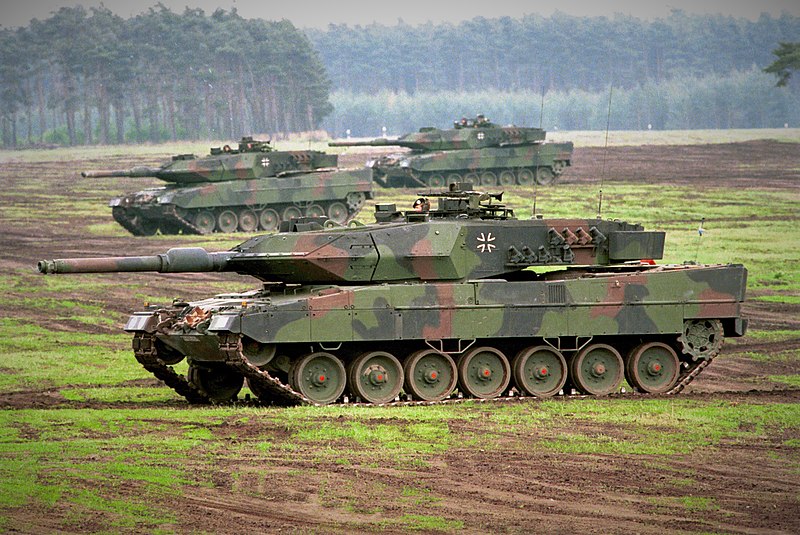The German defense ministry announced that its Leopard 2 tanks have arrived in Ukraine as Kyiv looks to bolster its arsenal in the ongoing war. Several other German battle vehicles have also arrived along with the tanks.
The German defense ministry announced on Monday that the 18 Leopard 2 battle tanks it has provided for Ukraine have already arrived in Kyiv, following its green light to provide Kyiv with such tanks back in January.
Aside from the 18 Leopard 2 tanks, 40 German Marder infantry fighting vehicles and two armored recovery vehicles have also arrived in Ukraine, according to a security source familiar with the matter. The source also added that three Leopard tanks that were donated by Portugal have also arrived in Ukraine.
“I’m sure that they can make a decisive contribution on the front,” tweeted German defense minister Boris Pistorius.
The German military trained the Ukrainian tank crews and the troops assigned to use the Marder vehicles in Muenster and Bergen in northern Germany for several weeks.
On the same day, Reuters reported that German prosecutors searched the home of two pro-Russia activists for evidence to corroborate following a January report by the outlet that the activists, Max Schlund and his romantic partner Elena Kolbasnikova donated funds from pro-Russian supporters in Germany to a Russian unit fighting in Ukraine. The funds were reportedly used to buy walkie-talkie radios, headsets, and telephones.
The European Union sanctions on Russia include the ban on supplying or financing the purchase of goods for the Russian military, such as radio gear. Under German law, the punishment for those found to have breached the sanctions is five-year imprisonment.
A representative of the public prosecutors in Cologne, Ulf Willuhn, said German officers executed a search warrant on Monday at the couple’s residence, taking computers and folders with written documents. Willuhn said prosecutors would use the evidence taken to determine whether Schlund and Kolbasnikova violated paragraph 18 of the German foreign trade and payments act, which details punishments for violations of international sanctions.
Willuhn said the search was prompted partly due to the Reuters report and said that prosecutors had also been looking for evidence that could determine whether Schlund and Kolbasnikova violated section 140 of the German criminal code that involves speaking in support of criminal acts.



 Jack Lang Resigns as Head of Arab World Institute Amid Epstein Controversy
Jack Lang Resigns as Head of Arab World Institute Amid Epstein Controversy  TrumpRx.gov Highlights GLP-1 Drug Discounts but Offers Limited Savings for Most Americans
TrumpRx.gov Highlights GLP-1 Drug Discounts but Offers Limited Savings for Most Americans  U.S. Lawmakers to Review Unredacted Jeffrey Epstein DOJ Files Starting Monday
U.S. Lawmakers to Review Unredacted Jeffrey Epstein DOJ Files Starting Monday  Pentagon Ends Military Education Programs With Harvard University
Pentagon Ends Military Education Programs With Harvard University  China Warns US Arms Sales to Taiwan Could Disrupt Trump’s Planned Visit
China Warns US Arms Sales to Taiwan Could Disrupt Trump’s Planned Visit  Federal Judge Restores Funding for Gateway Rail Tunnel Project
Federal Judge Restores Funding for Gateway Rail Tunnel Project  Iran–U.S. Nuclear Talks in Oman Face Major Hurdles Amid Rising Regional Tensions
Iran–U.S. Nuclear Talks in Oman Face Major Hurdles Amid Rising Regional Tensions  Trump Says “Very Good Talks” Underway on Russia-Ukraine War as Peace Efforts Continue
Trump Says “Very Good Talks” Underway on Russia-Ukraine War as Peace Efforts Continue  U.S. Announces Additional $6 Million in Humanitarian Aid to Cuba Amid Oil Sanctions and Fuel Shortages
U.S. Announces Additional $6 Million in Humanitarian Aid to Cuba Amid Oil Sanctions and Fuel Shortages  Trump Lifts 25% Tariff on Indian Goods in Strategic U.S.–India Trade and Energy Deal
Trump Lifts 25% Tariff on Indian Goods in Strategic U.S.–India Trade and Energy Deal  India–U.S. Interim Trade Pact Cuts Auto Tariffs but Leaves Tesla Out
India–U.S. Interim Trade Pact Cuts Auto Tariffs but Leaves Tesla Out  Trump Backs Nexstar–Tegna Merger Amid Shifting U.S. Media Landscape
Trump Backs Nexstar–Tegna Merger Amid Shifting U.S. Media Landscape  U.S.-India Trade Framework Signals Major Shift in Tariffs, Energy, and Supply Chains
U.S.-India Trade Framework Signals Major Shift in Tariffs, Energy, and Supply Chains  Netanyahu to Meet Trump in Washington as Iran Nuclear Talks Intensify
Netanyahu to Meet Trump in Washington as Iran Nuclear Talks Intensify  Missouri Judge Dismisses Lawsuit Challenging Starbucks’ Diversity and Inclusion Policies
Missouri Judge Dismisses Lawsuit Challenging Starbucks’ Diversity and Inclusion Policies  US Pushes Ukraine-Russia Peace Talks Before Summer Amid Escalating Attacks
US Pushes Ukraine-Russia Peace Talks Before Summer Amid Escalating Attacks  Nighttime Shelling Causes Serious Damage in Russia’s Belgorod Region Near Ukraine Border
Nighttime Shelling Causes Serious Damage in Russia’s Belgorod Region Near Ukraine Border 































